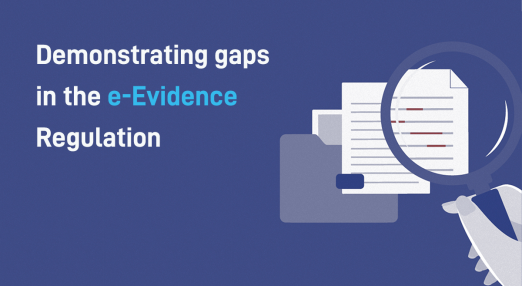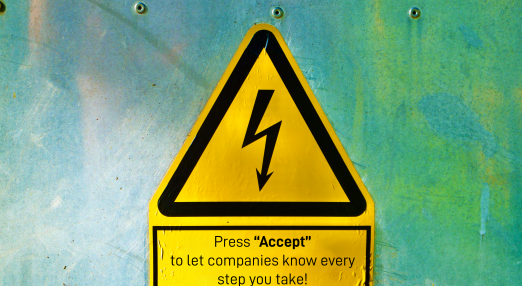Our work
EDRi is the biggest European network defending rights and freedoms online. We work to to challenge private and state actors who abuse their power to control or manipulate the public. We do so by advocating for robust and enforced laws, informing and mobilising people, promoting a healthy and accountable technology market, and building a movement of organisations and individuals committed to digital rights and freedoms in a connected world.
Filter resources
-

MEPs poised to vote blank cheque for Europol using AI tools
This week, MEPs recognised the dangers of certain uses of Artificial Intelligence (AI) in criminal justice. A strong majority rallied around the landmark AI in criminal matters report by the European Parliament's Civil Liberties, Justice and Home Affairs (LIBE) committee, which opposes AI that 'predicts' criminal behaviour and calls for a ban on biometric surveillance.
Read more
-

Position Paper: The EDRi guide to 2,297 amendment proposals for the DSA
Various committees in the European Parliament have tabled such a large number of amendments for the Digital Services Act (DSA) that today, EDRi publishes a guide to support Members of the European Parliament in navigating those that would help create a successful, open, and rights-respecting European digital sphere.
Read more
-

EDRi-gram, 20 October 2021
In this edition of the EDRi-gram, we share the launch of a collection of four scenarios that describe situations involving cross-border access to personal data and explains the necessary safeguards needed in the e-Evidence Proposal to mitigate these fundamental rights harms. We also demonstrate how software embedded in people’s devices can monitor our movements and surveil us, how a ban on surveillance advertising can fix Facebook and a lot more. Also now's your chance to submit your session proposal for the 10th annual Privacy Camp event, happening on January 25, 2022!
Read more
-

You Shall Not Pass! Wikimedia Foundation Denied Observer Status At WIPO
China blocked the Wikimedia Foundation’s bid for observer status at WIPO. This is the second time this has happened after the Foundation’s initial application in 2020. Wikimedia’s exclusion sets a worrying precedent and should alert European lawmakers who are concerned about the democratic governance of intergovernmental organizations. EDRi's member Wikimedia Germany sheds some light on the case.
Read more
-

The EU Parliament Took a Stance Against AI Mass Surveillance: What are the Global Implications?
The European Parliament's resolution on artificial intelligence in criminal law and its use by the police presents an opportunity for the EU to reconsider its role in the development of such tools, their sale, or use as part of its counter-terrorism and anti-immigration policies abroad.
Read more
-

Booklet: Demonstrating gaps in the e-Evidence Regulation
The Regulation on cross border access to data by law enforcement (so-called “e-Evidence” Regulation) threatens to put the rights of journalists, lawyers, doctors, social workers and individuals in general at great risk. EDRi and 13 civil rights organisations have just launched four scenarios that clearly depict how our future could enfold if the Regulation is approved.
Read more
-

Bugs in our pockets?
Now, in Bugs in our Pockets: The Risks of Client-Side Scanning, the authors take a long hard look at the options for mass surveillance via software embedded in people’s devices, as opposed to the current practice of monitoring our communications. Client-side scanning, as the agencies’ new wet dream is called, has a range of possible missions. While Apple and the FBI talked about finding still images of sex abuse, the EU was talking last year about videos and text too, and of targeting terrorism once the argument had been won on child protection.
Read more
-

If you want digital policy done right, propose it yourself
Fed up with the digital policies in Germany or the lack thereof in the past decades, EDRi member Chaos Computer Club e.V. (CCC) submitted their own proposal for a digital agenda of the new German government. Digital policy has been severely neglected by past governments. This explains the extended list of topics being tackled in this proposal.
Read more
-

Closing the Loopholes in EU’s Net Neutrality Framework
The European net neutrality rules are being reformed to fix one of the biggest loopholes in the EU‘s framework: Zero-Rating. EDRi has been vocal about the dangers of Zero-Rating, a practice by which telecoms companies discriminate between online services by making some data traffic more expensive than other such traffic. Prompted by three judgments of the Court of Justice of the European Union, the Board of European Regulators for Electronic Communications (BEREC) has acknowledged that their previous 2016 Guidelines on how to enforce the Net Neutrality Regulation have to be overhauled. The direction of the reform is looking to confirm the previous submissions of EDRi over the past six years and today we add another submission to BEREC with the hope of fixing the last loophole in Europe’s net neutrality framework.
Read more
-

Press “Accept” to let companies know every step you take
When you download a free app and accept their privacy statement, did you know that you may just have allowed data about your movement to be sold freely to anyone who’s willing to pay? EDRi's member Elektronisk Forpost Norge (EFN) shares more.
Read more
-

noyb publishes the draft decision by the DPC in the case against Facebook
The Irish Data Protection Commission (DPC) has sent a draft decision to EDRi's member noyb - European Center for Digital Rights and informed noyb that the draft decision would be shared with the other European Data Protection Authorities for consultation. The case concerns Facebook's reliance on contracts for serving advertising to its users - the legal trick Facebook applied in May 2018 to bypass the GDPR.
Read more
-

Facebook Files: How a ban on surveillance advertising can fix Facebook
Facebook is engulfed in the biggest crisis to hit the company since the Cambridge Analytica scandal. The explosive revelations by whistle-blower Frances Haugen, is that Facebook’s leadership refused to make changes that would make their platforms safer because they “put their immense profits before people”.
Read more
